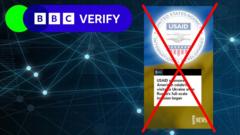A video alleging that the United States Agency for International Development (USAID) has compensated Hollywood stars with millions of dollars for their visits to Ukraine has gone viral on social media platforms. This claim has been further propelled by high-profile figures, including entrepreneur Elon Musk, who shared the clip with his audience, amplifying its reach.
However, analysis reveals that the video is fabricated and exhibits characteristics typical of Russian disinformation campaigns that have been scrutinized by investigative organizations, including the BBC. BBC Verify's Olga Robinson has provided insights into the methods used in the production of this misleading content and its implications on public perception.
Disinformation campaigns have become increasingly common as geopolitical tensions rise, particularly in relation to the ongoing conflict in Ukraine. Experts warn that misleading narratives can shape public opinion and potentially undermine significant humanitarian efforts by agencies like USAID.
In response to the video, fact-checkers and media organizations are emphasizing the importance of critical media consumption and verification before sharing content online. The struggle against misinformation continues to be a pressing issue, drawing attention to the responsibilities of both social media platforms and the public in addressing potential false narratives.
As this situation unfolds, it remains vital for consumers of information to remain vigilant and prioritize accuracy, particularly in contexts where misinformation could have far-reaching consequences.

















